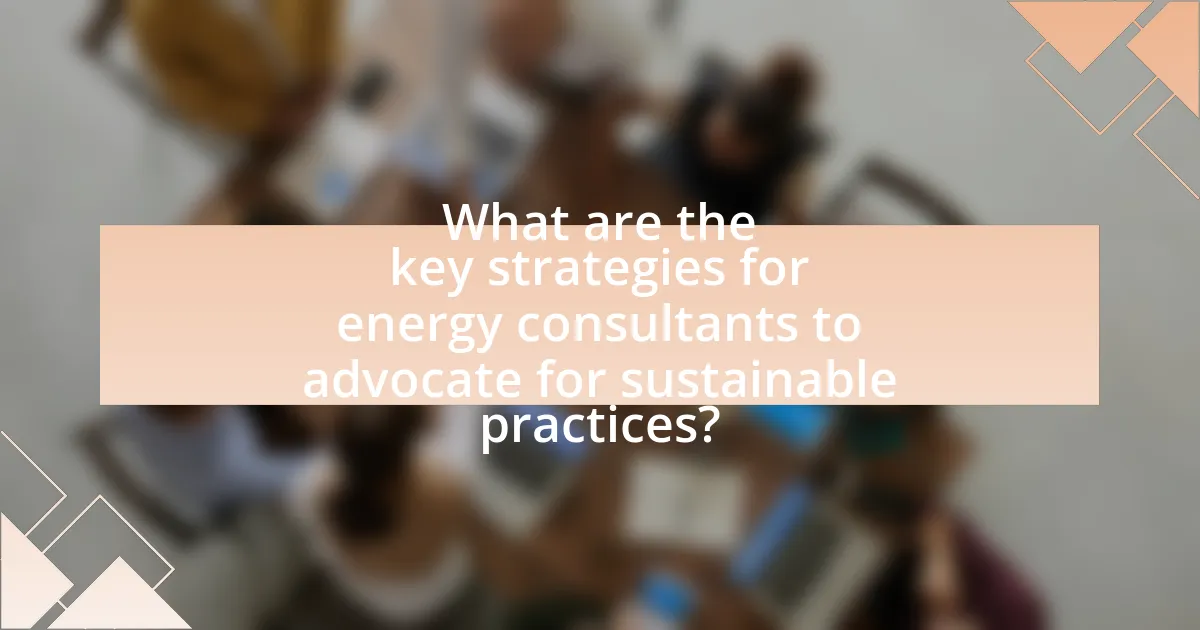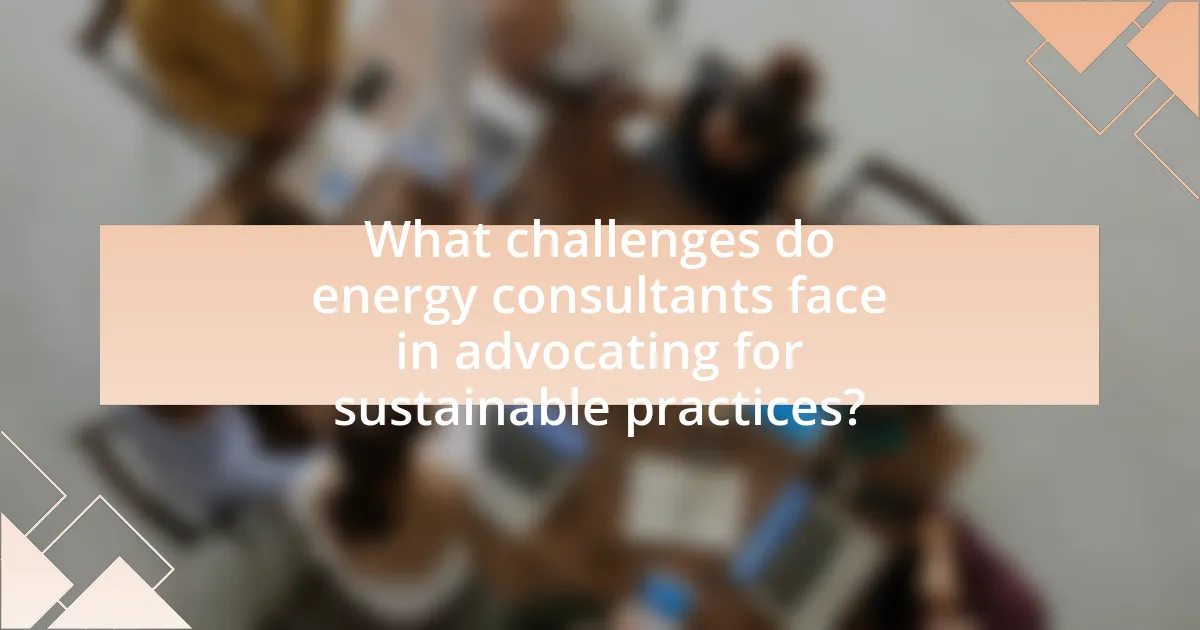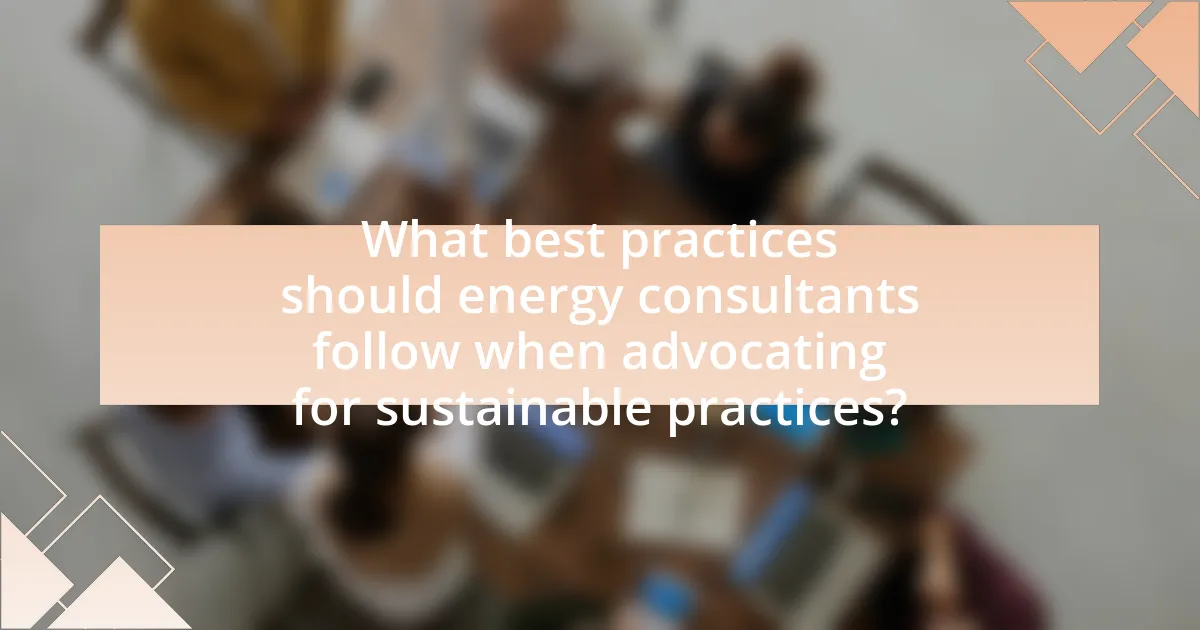Energy consultants play a crucial role in advocating for sustainable practices through various strategies. Key approaches include conducting comprehensive energy audits, promoting renewable energy solutions, and educating clients on energy efficiency. Effective communication of sustainability’s importance is achieved through data-driven presentations, transparency, and storytelling. Consultants face challenges such as stakeholder resistance and misconceptions about sustainability, which can be addressed through education and demonstrating financial benefits. Building partnerships and leveraging data are essential for enhancing advocacy efforts, while staying updated on trends and regulations is vital for successful implementation of sustainability initiatives.

What are the key strategies for energy consultants to advocate for sustainable practices?
Energy consultants can effectively advocate for sustainable practices by employing strategies such as conducting comprehensive energy audits, promoting renewable energy solutions, and educating clients on energy efficiency. Comprehensive energy audits allow consultants to identify inefficiencies and recommend tailored solutions, which can lead to significant cost savings and reduced environmental impact. Promoting renewable energy solutions, such as solar or wind power, helps clients transition to cleaner energy sources, aligning with global sustainability goals. Additionally, educating clients on energy efficiency measures, such as advanced building technologies and behavioral changes, empowers them to make informed decisions that contribute to sustainability. These strategies are supported by data indicating that energy-efficient practices can reduce energy consumption by up to 30%, demonstrating their effectiveness in promoting sustainable practices.
How can energy consultants effectively communicate the importance of sustainability?
Energy consultants can effectively communicate the importance of sustainability by utilizing data-driven presentations that highlight the economic, environmental, and social benefits of sustainable practices. For instance, studies show that implementing energy-efficient solutions can reduce operational costs by up to 30%, as reported by the U.S. Department of Energy. Additionally, consultants can leverage case studies that demonstrate successful sustainability initiatives, such as the 2019 report from the World Resources Institute, which found that companies adopting sustainable practices saw a 20% increase in brand loyalty. By presenting clear, quantifiable benefits and real-world examples, energy consultants can engage stakeholders and foster a deeper understanding of sustainability’s critical role in long-term success.
What messaging techniques resonate most with clients regarding sustainability?
Effective messaging techniques that resonate with clients regarding sustainability include emphasizing transparency, showcasing tangible benefits, and utilizing storytelling. Transparency builds trust, as clients appreciate clear communication about sustainability practices and their impacts. For instance, a study by Nielsen found that 66% of consumers are willing to pay more for sustainable brands, highlighting the importance of demonstrating the value of sustainable choices. Showcasing tangible benefits, such as cost savings from energy efficiency, further engages clients by connecting sustainability to their financial interests. Additionally, storytelling creates emotional connections, making sustainability relatable and inspiring action; research from the Harvard Business Review indicates that narratives can significantly influence consumer behavior. These techniques collectively enhance client engagement and commitment to sustainable practices.
How can storytelling enhance the advocacy for sustainable practices?
Storytelling enhances the advocacy for sustainable practices by creating emotional connections that resonate with audiences, making complex issues more relatable and actionable. Through narratives, individuals can visualize the impact of sustainability efforts, such as the success stories of communities that have adopted renewable energy sources, which can lead to increased public support and engagement. Research indicates that stories can increase retention of information by up to 65%, making them a powerful tool for conveying the importance of sustainable practices and motivating behavioral change.
What role does data play in advocating for sustainable practices?
Data plays a crucial role in advocating for sustainable practices by providing evidence-based insights that inform decision-making and policy development. Through the analysis of environmental metrics, energy consumption patterns, and resource utilization, data enables stakeholders to identify inefficiencies and areas for improvement. For instance, a study by the International Energy Agency found that data-driven energy management can lead to a 10-30% reduction in energy use in commercial buildings. This quantifiable impact demonstrates how data not only supports the case for sustainability but also guides the implementation of effective strategies.
How can energy consultants leverage data to support their recommendations?
Energy consultants can leverage data by utilizing analytics to identify energy consumption patterns and inefficiencies, which supports their recommendations for sustainable practices. By analyzing historical energy usage data, consultants can pinpoint areas where energy savings can be achieved, such as through the implementation of energy-efficient technologies or practices. For instance, a study by the U.S. Department of Energy found that energy audits, which rely heavily on data analysis, can lead to energy savings of 10-30% in commercial buildings. This data-driven approach not only enhances the credibility of their recommendations but also provides clients with quantifiable metrics to justify investments in sustainability initiatives.
What types of data are most persuasive in sustainability discussions?
Quantitative data, such as statistics on carbon emissions reductions and cost savings from energy efficiency, are the most persuasive in sustainability discussions. This type of data provides concrete evidence of the benefits of sustainable practices, making it easier for stakeholders to understand the impact. For instance, a study by the International Energy Agency found that energy efficiency measures could reduce global energy demand by 12% by 2040, demonstrating significant potential for sustainability. Additionally, case studies showcasing successful implementations of sustainable practices, like the 30% reduction in energy costs achieved by companies adopting renewable energy sources, further reinforce the argument for sustainability.
How can energy consultants build partnerships to promote sustainability?
Energy consultants can build partnerships to promote sustainability by collaborating with businesses, government agencies, and non-profit organizations focused on environmental initiatives. These partnerships enable energy consultants to leverage resources, share knowledge, and implement joint projects that enhance sustainability efforts. For instance, a study by the International Energy Agency highlights that collaborative approaches can lead to a 30% increase in energy efficiency when multiple stakeholders work together on sustainability projects. By establishing these alliances, energy consultants can create a broader impact and drive systemic change in energy consumption and management practices.
What organizations should energy consultants collaborate with for maximum impact?
Energy consultants should collaborate with governmental agencies, non-profit organizations, and industry associations for maximum impact. Governmental agencies, such as the U.S. Department of Energy, provide regulatory frameworks and funding opportunities that can enhance energy efficiency initiatives. Non-profit organizations, like the World Resources Institute, focus on sustainability and can offer valuable research and advocacy support. Industry associations, such as the American Council for an Energy-Efficient Economy, facilitate networking and knowledge sharing among professionals, which can lead to innovative solutions and best practices in energy management. Collaborating with these organizations enables energy consultants to leverage resources, expertise, and influence to drive sustainable practices effectively.
How can networking enhance advocacy efforts for sustainable practices?
Networking enhances advocacy efforts for sustainable practices by facilitating collaboration among stakeholders, sharing resources, and amplifying voices. Through networking, energy consultants can connect with policymakers, businesses, and community organizations, creating a unified front that strengthens advocacy initiatives. For instance, a study by the World Resources Institute highlights that collaborative networks can lead to more effective policy changes, as they pool diverse expertise and resources, resulting in comprehensive strategies for sustainability. This interconnectedness not only increases visibility for sustainable practices but also fosters innovation through shared knowledge and experiences.

What challenges do energy consultants face in advocating for sustainable practices?
Energy consultants face several challenges in advocating for sustainable practices, primarily due to resistance from stakeholders and limited financial resources. Stakeholders, including clients and decision-makers, often prioritize short-term cost savings over long-term sustainability benefits, making it difficult for consultants to promote eco-friendly solutions. Additionally, many organizations lack the budget to invest in sustainable technologies, which further complicates the consultants’ efforts. According to a 2021 report by the International Energy Agency, 70% of companies cite financial constraints as a significant barrier to implementing sustainable practices. This data underscores the financial hurdles that energy consultants must navigate while advocating for change.
What are the common misconceptions about sustainability that consultants encounter?
Common misconceptions about sustainability that consultants encounter include the belief that sustainability is solely about environmental issues, that it is too costly for businesses, and that it requires sacrificing quality or performance. Many people think sustainability only pertains to reducing carbon footprints, overlooking its broader implications, such as social equity and economic viability. Additionally, studies show that companies implementing sustainable practices often experience long-term cost savings, contradicting the notion that sustainability is prohibitively expensive. Furthermore, advancements in technology and sustainable materials demonstrate that high-quality products can be achieved without compromising environmental goals.
How can energy consultants address these misconceptions effectively?
Energy consultants can effectively address misconceptions by providing clear, evidence-based information tailored to their audience’s needs. They should utilize data from credible sources, such as the U.S. Department of Energy, which reports that energy efficiency can reduce energy consumption by up to 30%. By conducting workshops and seminars, consultants can engage stakeholders directly, dispelling myths through interactive discussions and real-world case studies. Additionally, creating accessible resources, such as infographics and FAQs, can help clarify complex concepts, making them easier to understand. This approach not only educates but also builds trust, as demonstrated by a study from the International Energy Agency, which found that informed clients are more likely to adopt sustainable practices.
What strategies can be employed to overcome client resistance to sustainability?
To overcome client resistance to sustainability, energy consultants can employ strategies such as education, demonstrating financial benefits, and leveraging social proof. Education involves providing clients with clear, factual information about the environmental and economic impacts of sustainable practices, which can help dispel misconceptions. Demonstrating financial benefits includes presenting case studies or data showing cost savings and return on investment from sustainable initiatives; for instance, a study by the International Energy Agency found that energy efficiency measures can yield savings of up to 30% on energy bills. Leveraging social proof entails showcasing successful sustainability projects from similar clients or industry leaders, which can build trust and encourage adoption. These strategies collectively address client concerns and facilitate a more receptive attitude towards sustainability.
How do regulatory and policy changes impact advocacy efforts?
Regulatory and policy changes significantly influence advocacy efforts by altering the legal and operational landscape within which organizations operate. For instance, when new environmental regulations are enacted, advocacy groups may mobilize to support compliance and promote sustainable practices among businesses. A concrete example is the implementation of the Clean Power Plan in the United States, which prompted various advocacy organizations to push for renewable energy adoption and energy efficiency measures. These changes can either empower advocacy efforts by providing a framework for action or create challenges if regulations are perceived as restrictive, thereby shaping the strategies and focus of advocacy initiatives.
What recent regulations should energy consultants be aware of?
Energy consultants should be aware of the Inflation Reduction Act of 2022, which significantly impacts energy policy and funding for renewable energy projects. This legislation allocates approximately $369 billion towards energy security and climate change initiatives, including tax credits for solar, wind, and other renewable energy sources. Additionally, the act introduces incentives for energy efficiency improvements in residential and commercial buildings, which energy consultants can leverage to promote sustainable practices. The act’s provisions are designed to accelerate the transition to clean energy and reduce greenhouse gas emissions, making it crucial for energy consultants to stay informed about its implications for their projects and clients.
How can consultants influence policy changes to support sustainability?
Consultants can influence policy changes to support sustainability by leveraging their expertise to provide data-driven recommendations and facilitate stakeholder engagement. By conducting thorough analyses of environmental impacts and presenting evidence-based solutions, consultants can help policymakers understand the benefits of sustainable practices. For instance, a study by the International Energy Agency highlights that expert consultations can lead to more informed decisions, resulting in policies that promote renewable energy adoption and energy efficiency. Additionally, consultants can act as intermediaries, bringing together businesses, government entities, and community organizations to advocate for policies that align with sustainability goals, thereby fostering collaborative efforts that enhance policy effectiveness.

What best practices should energy consultants follow when advocating for sustainable practices?
Energy consultants should prioritize data-driven assessments and stakeholder engagement when advocating for sustainable practices. By utilizing comprehensive energy audits and analytics, consultants can identify inefficiencies and recommend tailored solutions that align with sustainability goals. Engaging stakeholders, including clients and community members, fosters collaboration and ensures that proposed practices meet diverse needs and expectations. Research indicates that projects with strong stakeholder involvement are 30% more likely to succeed in achieving sustainability targets, highlighting the importance of this approach. Additionally, staying informed about the latest technologies and regulatory frameworks enables consultants to provide relevant and effective recommendations, further enhancing their advocacy efforts.
How can energy consultants stay updated on sustainability trends and technologies?
Energy consultants can stay updated on sustainability trends and technologies by actively engaging in continuous education and professional development. This includes attending industry conferences, participating in webinars, and enrolling in relevant courses that focus on the latest advancements in sustainability. For instance, organizations like the International Society of Sustainability Professionals offer certifications and resources that keep professionals informed about emerging trends. Additionally, subscribing to industry publications and following thought leaders on platforms like LinkedIn can provide timely insights and updates. Research indicates that professionals who engage in ongoing learning are better equipped to implement innovative solutions, as highlighted in a study by the National Renewable Energy Laboratory, which found that continuous education significantly enhances knowledge retention and application in the field.
What resources are available for continuous learning in sustainability?
Online courses, webinars, and certification programs are key resources for continuous learning in sustainability. Platforms like Coursera, edX, and FutureLearn offer courses from universities and organizations focused on sustainable practices, climate change, and environmental management. For instance, the University of Cambridge provides a course on “Sustainable Business” through edX, which emphasizes practical applications in sustainability. Additionally, organizations such as the International Society of Sustainability Professionals (ISSP) offer certifications and resources that enhance knowledge and skills in sustainability practices. These resources are essential for energy consultants to stay updated on best practices and emerging trends in sustainability.
How can attending conferences and workshops benefit energy consultants?
Attending conferences and workshops benefits energy consultants by providing them with opportunities to network, gain insights into industry trends, and enhance their knowledge of sustainable practices. These events facilitate connections with other professionals, allowing energy consultants to share experiences and collaborate on projects, which can lead to innovative solutions in energy efficiency. Additionally, workshops often feature expert speakers who present the latest research and technologies, enabling consultants to stay informed about advancements that can be applied in their work. For instance, a study by the International Energy Agency highlights that continuous professional development through such events significantly improves consultants’ effectiveness in implementing sustainable energy solutions.
What practical tips can energy consultants implement in their advocacy efforts?
Energy consultants can implement several practical tips in their advocacy efforts, including building strong relationships with stakeholders, utilizing data-driven insights, and promoting community engagement. Establishing connections with policymakers, businesses, and community leaders enhances collaboration and fosters support for sustainable initiatives. Data-driven insights, such as energy consumption statistics and environmental impact assessments, provide compelling evidence to advocate for specific changes. Additionally, promoting community engagement through workshops and informational sessions raises awareness and encourages public participation in sustainability efforts. These strategies are effective as they leverage collaboration, evidence, and community involvement to drive meaningful change in energy practices.
How can consultants create actionable sustainability plans for clients?
Consultants can create actionable sustainability plans for clients by conducting thorough assessments of the client’s current practices, identifying areas for improvement, and setting measurable goals. This process involves analyzing energy consumption, waste management, and resource utilization to establish a baseline. For instance, a study by the International Energy Agency indicates that organizations can reduce energy costs by up to 30% through targeted efficiency measures. Consultants then develop tailored strategies that align with the client’s business objectives, ensuring that sustainability initiatives are both practical and impactful. By incorporating industry benchmarks and best practices, consultants can provide clients with a clear roadmap for implementation, facilitating accountability and progress tracking.
What are the key elements of a successful sustainability proposal?
A successful sustainability proposal includes clear objectives, a comprehensive assessment of environmental impacts, stakeholder engagement, measurable outcomes, and a detailed implementation plan. Clear objectives define the purpose and goals of the proposal, ensuring alignment with sustainability principles. A comprehensive assessment of environmental impacts evaluates the current situation and identifies areas for improvement, supported by data and research. Stakeholder engagement involves collaboration with affected parties to gather input and foster support, which is crucial for the proposal’s acceptance. Measurable outcomes establish criteria for success, allowing for tracking progress and accountability. Finally, a detailed implementation plan outlines the steps, resources, and timeline necessary to achieve the proposed sustainability initiatives, ensuring feasibility and clarity.